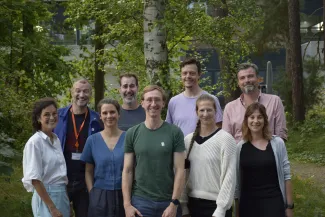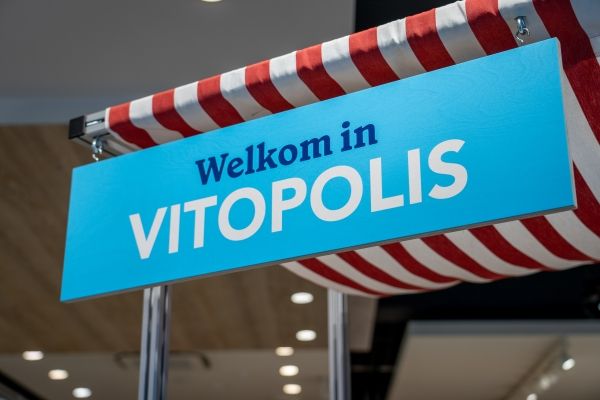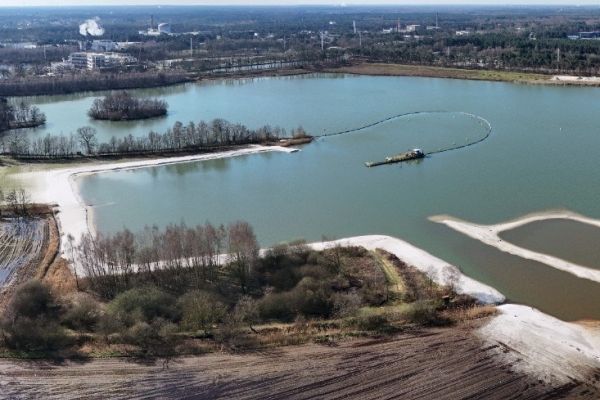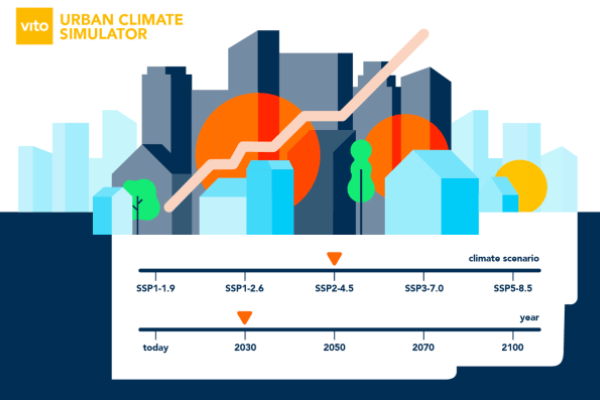Systems thinking with VITO Nexus: addressing the dynamics behind sustainability issues
VITO Nexus is convinced that if we want a thriving future for our society and planet, we will have to significantly increase the sustainability of our actions. In today's complex society, sustainability issues cannot be addressed in isolation. Because they are intertwined within a larger 'system', action must also be taken at that level. This is called system change, or system innovation, which is the focus of the VITO Nexus team.

Systems thinking seeks an understanding of the whole, in addition to the usual focus on individual parts. Consider, for example, our use of space. Someone looking at that from a biodiversity perspective will take a different view than someone from the field of energy production, etc. It is not just about understanding individual components, but also about exploring patterns, connections and relationships among these elements so that the whole can be approached holistically. Exactly according to this theory, VITO Nexus, a specialised research team at VITO, works on the most intractable sustainability issues.
Not treating symptoms, but addressing root causes
VITO Nexus is a multidisciplinary team that focuses on systems thinking as a method to address issues in order to contribute to an accelerated sustainability transition. 'One of the important concerns within transition work is how we learn about the systems we will need to change,' explains Waldo Galle of VITO Nexus. 'We do not want to engage in individual symptom management, but rather address root causes. The systemic approach also has the consequence for us as researchers that rather than claiming to have one solution to one problem, we are collaborating and continually learning. An example familiar to everyone is the traffic jam problem. You might think to address this by making more lanes so there is more space, but then only more people will end up choosing the car. This has already been scientifically proven, and does not address the problem at its root.'
Not typical process guidance, but transversal thinking and doing
The Nexus team works transversally: 'VITO Nexus is not a typical process facilitator. For us, researching and doing go hand in hand and we do it transversally, across silos. Along with our knowledge of processes of change from transition science, we also bring a very broad substantive scientific expertise to the table thanks to our embedding in VITO.
This was nicely expressed, for example, at the transition arena water, an initiative supported by VITO and the Flemish Knowledge Centre Water (Vlakwa), where, together with a number of water actors in Flanders, such as De Watergroep and Aquafin, we set out a systemic long-term vision for water in Flanders. Together with artists, we looked at what the future of our water system in Flanders would look like, what the dynamics (systems) underneath symptoms such as drought or flooding are, and so on. In this way, we want to challenge the water sector to build a future-proof, systemic view of the water system.' The research was translated, in part by VITO Nexus, into a concrete agenda with ambitions and action points for a sustainable water system for Flanders.
Learning programme in collaboration with InnovatieNetwerk Overheid
Meanwhile, in order to familiarise researchers, policy makers, companies and other actors in society with system innovation, VITO Nexus set up a learning programme together with the Flemish government innovation network InnovatieNetwerk Overheid (INO). The programme consisted of four modules, the last of which will take place in the autumn of 2024. The modules were developed after the specific needs and interests of the participants had been identified.
Each module focuses on one main question:
-
Are we asking the right question? What is the real underlying challenge and how can we delineate it?
-
Where do you initiate action? What projects or experiments are needed? And how should you combine them?
-
How do you start that action? What collaborations are needed and how do you engage leaders, fresh thinkers and bridge builders?
-
How do we know if the action was successful? What and how best to learn?
So far, the programme with INO has been very positive and has had very diverse participants: the city of Genk, the municipality of Beringen, the Social Innovation Factory, the Flemish Government's Environment Department, the Public Employment Service of Flanders (VDAB) and the Flemish Community's education network, to name but a few. The city of Ghent even came back to VITO Nexus to dive deeper into their systemic issue concerning circular migration.
New learning programme and internal programme
This autumn, VITO Nexus is launching a new learning programme at the request of the Flemish Government's Environment Department. 'That will be about environmental issues,' Waldo continues. 'In addition, we are developing a transition scan for that Environment Department, which will allow them to more easily identify whether initiatives and policies can have a lasting sustainable impact.
Finally, we now also have a programme for fellow researchers at VITO. There, the approach is that not only we at VITO Nexus can have a systems reflex or carry out systems analysis. On the contrary, anyone can do it with the right reflex and practical tools. Therefore, we would like to pass on our knowledge and coach colleagues in this.
Meanwhile, a podcast has been released as well, featuring experiences of participants in the INO programme. We hope that in the future more and more people will learn about VITO Nexus and our programmes. We remain committed to spreading systems thinking more widely to achieve structural change,' Waldo concludes.





